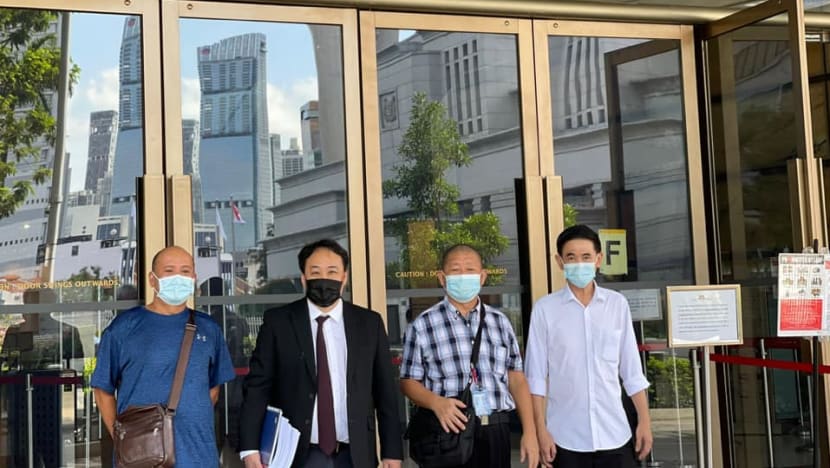High Court dismisses ex-bus captain’s lawsuit against SBS Transit on rostering, pay practices
Mr Chua Qwong Meng's lawsuit was a test case linked to 12 other bus captains making similar claims against SBS Transit.

Lawyer Lim Tean (second from left) and his client, ex-bus driver Chua Qwong Meng (third from left) outside the Supreme Court. (Photo: Facebook/Lim Tean)
SINGAPORE: A High Court judge on Friday (Aug 26) dismissed a lawsuit filed by a former bus captain that alleged unfair rostering and pay practices by SBS Transit.
Mr Chua Qwong Meng’s lawsuit was a test case linked to 12 other bus captains making similar claims against the public transport provider.
Justice Audrey Lim allowed the case to be heard in the High Court after finding that it raised important questions of law affecting a large class of employees.
Mr Chua, who is represented by lawyer Lim Tean, worked for SBS Transit from 2017 to 2020. His suit alleged several breaches of his employment contract and the Employment Act.
He claimed that SBS forced him to work seven consecutive days before giving him a rest day, forced him to work overtime, and gave insufficient break times.
He also alleged that he was underpaid for working overtime and on a public holiday, among other claims.
In dismissing all of the plaintiff’s claims, Justice Lim relied on work calendar reports generated by SBS’ rostering and scheduling system to reach her findings.
Mr Chua disputed the authenticity of the reports at trial, but the judge accepted SBS’ evidence as proof that the reports were authentic.
The judge noted testimony from SBS CEO Cheng Siak Kian that the rostering system was “a gold standard for bus operators worldwide”.
The system issued notifications if there was an attempt to roster a bus captain without a rest day in a week, according to the testimony.
REST DAYS
The Employment Act states that “every employee must be allowed in each week a rest day without pay of one whole day”.
Mr Chua claimed that this meant he was entitled to a rest day on the seventh day of each week after working for six days.
He argued that otherwise, the provision could be abused by rostering workers’ rest days to fall on the first day and last day of a two-week period. This meant working for 12 consecutive days in between.
Justice Lim disagreed, finding that an employer is allowed to schedule a rest day on any day of the week, defined as “a continuous period of seven days”.
She found there was no evidence that SBS had rostered Mr Chua to work more than 12 days in between two rest days.
Mr Chua also claimed that he was compelled to work on his rest days “all the time” and given disciplinary notices if he refused.
The judge dismissed these as bare assertions unsupported by independent evidence.
OVERTIME AND BREAK TIMES
The Employment Act states that an employee who is required to work more than eight hours a day or more than 44 hours a week must be paid overtime.
Mr Chua’s contractual hours as an SBS bus captain amounted to 48 hours a week. He argued this meant that he was obliged to work overtime to earn his basic pay.
But SBS, represented by a team of lawyers from Davinder Singh Chambers, countered that the contractual 48 hours were gross hours that included break times of at least 45 minutes a day.
Excluding break times, this meant that Mr Chua would have qualified for his basic pay after working 43-and-a-half or fewer hours a week, they argued.
Justice Lim therefore found that the arrangement did not breach the Employment Act.
She also found that the rate of pay for the overtime hours that Mr Chua did work followed that in a collective agreement between SBS and the National Transport Workers’ Union, and was higher than the minimum rate in the Employment Act.
Mr Chua also claimed that SBS gave him fewer than 45 minutes of break time in his first eight hours of work, which is required under the Employment Act.
He said he was given break periods of 25 minutes and a toilet break period of about 10 minutes, which was “mere idealism” as the timings did not factor in traffic or parking delays.
Justice Lim considered whether the 45 minutes of break time must be given continuously, and whether Mr Chua had “an opportunity to have a meal” as specified in the Employment Act.
She found that employers can give multiple break times that add up to no less than 45 minutes, and that SBS allocated Mr Chua sufficient time to have meals.
The judge said she would hear the parties on costs at the next hearing.















